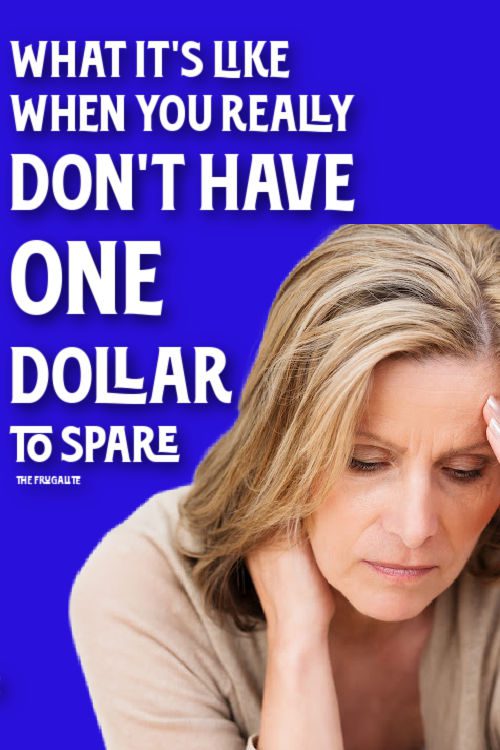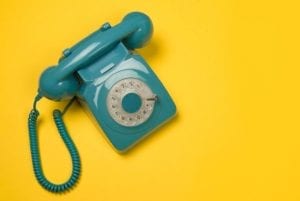(Psst: The FTC wants me to remind you that this website contains affiliate links. That means if you make a purchase from a link you click on, I might receive a small commission. This does not increase the price you’ll pay for that item nor does it decrease the awesomeness of the item. ~ Daisy)
By the author of The Ultimate Guide to Frugal Living and What to Eat When You’re Broke
I don’t know if you’ve ever been so broke you didn’t have any money to spare – not so much as a single dollar. I hope you haven’t, and I hope that nobody reading this ever has to face it.
I’ve been there, and it’s absolutely brutal.
I wanted to write about what that was like today. I’m not sure whether this will help anyone or not. But maybe someone who is going through it will read it and breathe a sigh of relief to know it’s not just them. Perhaps someone who’s never had to deal with it will gain some understanding of how soul-crushing it is and will find a renewed sense of compassion for those who are struggling.
Maybe it’ll help somebody, someday to know that your life won’t be like this forever, even if you don’t see a way out right now.
Shopping when your budget is this tight.
Whether you have money to spare or not, you still have to have a few basics. So, you go to the store hoping you can stretch your last $20 across enough food and toilet paper to get your family through until the next time you have money.
You start off with the things you really can’t do without. Maybe you need a pack of toilet paper. Maybe it’s that time of month and you or your daughter needs some supplies. Maybe you need formula or milk for a little one. You grab that first.
You do the math. You round up to account for any possible tax and you subtract your dire necessity from your twenty bucks. The last thing in the world you want is when you’re buying those tampons to have to make a scene at the register and have the checker take something off the bill because you don’t even enough money.
Now, you go and try to stretch what’s left as far as humanly possible. Minus one dollar for the cheapest pack of pasta. The price of a can of sauce has gone up to $1.70, taking more of your budget than you’d expected, but it’s still the cheapest meal you can put together. You subtract that too.
You go through the store, looking for deals, looking on the last day of sale racks, searching for whatever you can find to make the money stretch across a little bit more food.
Now you’re standing there in line, at the checkout counter. Nervously, you go through the contents of your cart and you add it up again. You think you’ll have about 20 cents left over if you’ve done your math correctly. Please let me have done the math correctly, you whisper to yourself.
You put things on the conveyor belt in a specific order. The thing you can most live without goes on last, just in case you’ve miscalculated. You hold your breath as the clerk scans your groceries. You watch the screen with bated breath…Please…
Something has rung up at a different price than you expected. While somebody else might not have caught it, you’re watching extremely carefully because you’re scared that you’re going to go over the cash you have on hand. The dilemma now is whether you let them know that the item was marked 40 cents lower than it came up on the register or whether you put something back.
You decide to put it back because what if that thing rings up too high, also? “Sorry,” you say to the clerk. “I changed my mind on this.”
They nod. They’ve seen it before. They know you didn’t change your mind, but they don’t say anything.
You leave, your heart pounding.
Driving when you have no extra money
You’ve linked this shopping trip with your route home from work. There’s a grocery store that’s a little bit cheaper but it’s out of the way. You’ve made the choice to get the slightly more expensive groceries to reduce the risk of running out of gas.
There will be no extra trips to the store. You won’t be going any place besides work, home, and school because you won’t have the money to refill the tank until the following week. You are going to live on a wing and a prayer, hoping your gasoline stretches far enough. Hoping nobody needs to be picked up from someplace further away than expected. Hoping that nothing comes up where you have no other option but to drive.
On that last day before you get paid, you see the needle has crept over to the E. Again, you start doing math in your head. “If I have 1 gallon of gas and my car gets 24 miles per gallon in the city, and I’m driving mostly on the highway, and work is 11 miles each way….Maybe…maybe I’ll make it.”
All the way home, your heart is in your throat. At every stoplight, you fight back the panic as it seems to go on and on, eating up your precious fuel. When you get home and park the car, the stress isn’t over. There’s still the trip to the gas station that will be the same high-stress ride.
Living when you have no extra money
Then there’s the gauntlet of everyday life. Life is full of things that are “just a dollar” that you don’t even notice until you don’t have a dollar.
Someone is taking up a collection at work for a worthy cause. “It’s just a dollar,” they tell you cheerfully. You tell them you’re sorry, but you don’t have any cash with you. You ask if you can bring it Monday, cheeks hot with embarrassment. “Sure,” they reply.
Your daughter wants money for pizza day at school the next day. Or chocolate milk day. Or a field trip. There’s always something, it seems. Some reason why children need to bring money to school. Just one dollar, the school tries to keep it cheap.
“I’m sorry,” you apologize to your daughter. “We’re not going to do that this week.” She’s angry. She thinks you’re mean. She doesn’t understand and you don’t know whether to tell her and stress her out, or not to tell her and just let her be mad.
Someone knocks over the gallon of milk that was supposed to last all week. It’s Tuesday. There’s no money to get more milk and that means the breakfast of cereal you’d planned for each day is now null and void. What the heck are you going to feed everyone for breakfast? What about that box of macaroni and cheese you were going to make? Don’t you need milk for that? Will they notice if you use water in the cheese powder? Your mind is racing a mile a minute trying to solve this series of dilemmas while you console the person who knocked over the milk. You know it was an accident but what the heck are you going to do now?
You skip lunch so the kids don’t have to. Maybe you skip dinner so the kids don’t have to also. You turn off the lights compulsively. You nervously do math in your head, constantly wondering what else might pop up before this week is through. What can you cut? What can you save? What can you re-use? What can you skip? Does everybody know?
The stress is relentless.
If you’re in this situation, you may have bill collectors phoning you constantly. Just the sound of your phone ringing fills you with dread and anxiety because you know it’s going to be someone demanding money you just don’t have. You could be ignoring a potentially serious medical problem because you can’t pay for the care. You might be letting your kids stay home alone after school because a babysitter is absolutely out of the question – you can barely afford to eat, for heaven’s sake.
You may be wondering when the other shoe will drop and when your electricity will get shut off. Or when your car will get repossessed. Or when you’ll be evicted and potentially living in that car. How will you tell your children? How will you tell your family?
How will you survive?
There is not one more thing you can cut. And everything you need costs just one dollar – and it’s a dollar you just don’t have.
If you’ve ever been in this situation, you know.
If you are reading this and it sounds familiar, you’ve been there. You know exactly what I’m describing.
I want you to know that even though it seems like you’re never going to survive and there’s no way out of this cycle, at some point, things will change. Life will get a little bit easier. You may not have tons of money to throw around, but you’ll have an extra dollar for your son to buy a slice of pizza at school. You’ll be able to put gas in your car before your running on fumes and fervent wishes. You’ll be able to replace that spilled milk, you’ll be able to eat more than one meal a day, and you’ll be able to go to the grocery store without compulsively doing math in your head.
Maybe you’ll change your living situation. Maybe you’ll get a better job. Maybe a roommate will move in. There are a million ways that things can change, and I don’t know what will change for you. But eventually, something will. And then life will get a little bit easier.
Until they do, try to find the space for some gratitude, even though it might be really hard right now. Try to do things that help you relieve the constant agonizing stress. Just going outside and looking at the sunshine or listening to the birds can make a world of difference.
You’ve made it this far. You’ve gotten through every broke period in your entire life. You’ll get through this one too.
I know you will.
Just hang in there.
Have you ever been so broke you didn’t have a single dollar to spare?
Have you ever had any of the experiences outlined in this article? Have you ever felt this level of financial stress? How did you break the cycle? Are you dealing with this currently? Do you have any words of encouragement for people going through it now?
Let’s talk about it in the comments section.
About Daisy
Daisy Luther is a coffee-swigging, adventure-seeking, globe-trotting blogger. She is the founder and publisher of three websites. 1) The Organic Prepper, which is about current events, preparedness, self-reliance, and the pursuit of liberty; 2) The Frugalite, a website with thrifty tips and solutions to help people get a handle on their personal finances without feeling deprived; and 3) PreppersDailyNews.com, an aggregate site where you can find links to all the most important news for those who wish to be prepared. Her work is widely republished across alternative media and she has appeared in many interviews.
Daisy is the best-selling author of 5 traditionally published books, 12 self-published books, and runs a small digital publishing company with PDF guides, printables, and courses at SelfRelianceand Survival.com You can find her on Facebook, Pinterest, Gab, MeWe, Parler, Instagram, and Twitter.












23 thoughts on “What It’s Like When You Really Don’t Have One Dollar to Spare”
I have been there. I lost so much weight you could see the bones in my chest. I used to tell my children I wasn’t hungry or that I already ate. I wanted to feed them. It was awful to worry about trying to feed my children when there was no income. Going to the store and thinking about asking for bones that the butcher didn’t need for “my dog”. Thinking I could use them for bone broth and that maybe there would be some meat on them, but worried that that would seem strange and not wanting to seem strange. Thinking about begging for money when I couldn’t find a job. But not doing it because I was worried about someone from the school recognizing me and not wanting to lose my kids. For comfort, I would spend time at the library or at the river with my children. I kept my house perfectly clean. I went for walks. I kept a journal. I will not forget when I got a great job in another town and state. I drove back to that State for something for my job. I drove back to that town just so I could feel what it was like to go to the local grocery store and buy anything I wanted. It was such a good feeling!
Things are not easy now, but they are nothing like when my kids were little and I didn’t have a job. It is not as hard to worry about feeding oneself compared to worrying about feeding your children who you love so much and you want good things for them. We have jobs now, preparing has been a priority. Our money is not stretching like it used to. But at least we have jobs. I appreciate that so much more because I remember what it was like when I didn’t have a job. When I couldn’t feed my children the way I wanted to.
I’ve been there. The funny thing is, my son told me the other day what some of his favorite foods were. They were the things I fed them, when I felt terrible about feeding them sub par food. I remember buying the cheapest thing I could find, just to feed them something. and that is what my son remembers as a favorite food! It made me feel so much better to know that the little bit we had made them happy. One thing I do now, is have food In the house. I also am very, very, frugal. Almost to absurdity. But, it is a fear to not be able to pay the bills, to have the water and electric turned off, to not have toilet paper, to not have food. My husband has never been without. So ,he is not as worried as me and likes to spend much more than me. We try to create a balance of fun and frugality.
I can relate to everything you wrote. I was also astonished to learn that to this day, my kids love ramen noodles and boxed mac and cheese. It made me feel much better. I also have a fear of not having enough money and I’m not sure you ever overcome it when you’ve been to this place. But it sure does increase your gratitude when things get better!
Daisy,
You are so Right! It does increase your gratitude for when things are good.
When I was growing up, it was a thing to hear adults talking about the great depression and teenagers rolling their eyes and wondering what was the big deal about it. My parents were both young adults in the 1930s, both had to work at whatever job they could find and because of circumstances way beyond their control (one because a flood had ruined her home and the other because his parents had died), they had no home to go back to. All that changes a person. Daddy and Mama were better with money than anyone I’ve ever known; and yet they were both warm, generous people. My husband says he learned about generosity from my dad; I think I learned resilience.
This is a terrific and important topic. Thank you!
This brings back so many memories. I lived on a burnt box of powdered milk, an out of date can of powdered slim fast that I found in the trash and a bag of very old kidney beans that I also found in the trash on the nights that the “father”had the kid. I was fortunate in that regard. I “ahem, liberated” veggies that fell to the ground in the landlords garden. We got by but not the best memories. My kid also loved the cheap food that I doctored up.
There are many cities that have charity-oriented food banks which are worth knowing about in tough times. It’s also worth knowing that the realty community regards homes with a walkability feature as having extra value. Walkability means being close enough to some, many, or most places you regularly need to visit … so that you can walk to and from those places … and get both the health and cost benefits. I’m in such a location that long ago was chosen partly because of such proximities. A compactible airline luggage style 2-wheel cart plus a large bag (whether backpack, duffle bag, or whatever) is typically rated to handle up to 150 pound loads. Because the load weight can usually be balanced so that the two wheels can be centered under the load … you can generally use just one hand at a time to pull the load. It is a lot easier if you have paved walkways most of the distance although occasional rough ground can be managed. That will easily handle a lot of grocery trips and spare you a lot of vehicle trips while getting you the exercise benefit of walking more often. Aldi typically offers such carts once a year for about $22 but Amazon has them year around.
–Lewis
Anyone in poverty with children can get WIC for food, milk, formula, etc. (WIC is for people with kids) as well as EBT (food stamps, which is for anyone based on income), and use food banks, which are non-governmental and often require no paperwork at all. A person can be ineligible for EBT, or eligible for a paltry amount like $12/mo, but still be fully eligible for food bank, it’s two entirely different things unrelated. Even that $12/mo adds up and many people will set it aside until Thanksgiving or Xmas to help offset the cost of the holiday meal ($12×12 months= ~$150. Then if you spend $100 at the store you get a free turkey etc).
No one should be wasting money on plastic and bleached menstrual products that are overpriced, bad for their health & the environment (use any kind of repurposed non-synthetic cloth. Cotton dishtowel ideal, fold in 3rds longwise).
Powdered milk is cheaper and won’t spoil, spill, or take up room in the fridge or be heavy and big to lug home. Never spend money, energy, space etc on water and air in your groceries if you can help it. Cereal is a terrible waste of money, per pound it costs far more than meat and it’s nothing but cheap starch and sugar puffed up with air wasting space. Check the price and choose better nutrition, if cereal is $11/lb head over to the marked down meat section and get meat, like chicken hindquarters at 80c/lb, and eggs if they are cheap, these are the foods with B12 and omega 3 that build the brain, not starch.
Worst case scenario if your vehicle runs out of gas, use the roadside assistance plan (elective on your car insurance around $5/mo), they’ll come out and give it a gallon or two of gas. Then leave it parked until you can get gas again. If it’s parked and won’t start because of being out of gas or dead battery, when you get paid call and request roadside assistance for gas or a jump. Then plan out your map of necessary errands. Do your longest distance errand first and try to avoid turning off engine while battery is recharging (use drive thru bank, drive thru pharmacy, drive thru post office drop off without going in, drive thru food bank pickup or Walmart grocery pickup and keep engine running, etc). Teach your kids you are not their taxi service. In generations past many moms didn’t drive at all, kids did not have a mom taxi at their beck & call. In many areas families didn’t have cars period (urban cities, small mining towns with the town built on top of the mine and men walked to work, etc). Kids walked, rode their bikes, took the school bus, and learned to use public transportation. In my state it’s finally being decided that every minor will be eligible for a free bus pass to use the buses, trains, and ferries.
Homeschool so they’re not coming home with demands, requests, or manipulation for cash from the school. Public schools should not send students home trying to extract cash from parents for any activity, extra food etc. (if you’re eligible, utilize the free or reduced cost school lunch) but they do. With the rise in homeschooling and online schooling those demands for cash can be a thing of the past as well as status issues and fads over clothing and consumer goods that children compete over and get upset about (expensive brand-name clothes,shoes,toys, activities, etc). Socializing and associating with families in your same situation eliminates class competition among the children who are more equally among their “peers” when they have similar lifestyle, income, etc and leads to much greater happiness in their growing up. Just because someone is the same age doesn’t mean they are a “peer” if their spending level, lifestyle, even religion, culture, or philosophy, etc is radically different. It means you have disparate young people being put together in situations assuming sameness when that sameness does not exist and putting them in competition and conflict with each other without them having any control of where they have to go and who they have to associate with. Kids growing up poor with others who are remember back fondly to their childhoods and say they didn’t realize they were poor because everyone they knew was similar, while kids who are not poor but have less money available to them and being spent on them such as a middle class or working class family living in a rich area or sending their child to a rich school, creates a negative experience for the child and bad memories and feelings they retain the rest of their life. Most areas will subsidize or provide internet service and laptops for each student to be able to do school from home, and for a number of reasons it’s a better option for many.
That moment when an article says, “Maybe this will help people be less judgmental,” and a person comes and pees all over every single point and emotion in the whole article in a spectacularly judgmental fashion.
Learn to be compassionate.
You’ve clearly never dealt with a situation like this, or you’d know you don’t just walk in and have someone hand you vouchers for all the freebies you seem to think are so easily accessible.
You sound like an absolute delight.
Respectfully, I believe G_J’s information may not all be based on firsthand knowledge. WIC is for pregnant and nursing mothers and children up to age 5. Food banks in my area (I’ve worked at one) do require proof of an address and identification, and there is a limit on how many visits may be made a month. Right now they’re short of almost everything as more people are struggling and fewer are making donations. Roadside assistance here comes with an insurance plan or is obtained separately, and I’ve never seen a plan for $5 a month – if there were, they’d be flooded with requests from my neighborhood from those who can afford to run a car.
Schools vary according to their funding in what is provided for children. Not every school provides laptops and tablets or free internet. Where I’m at parents can sign an agreement for the child to have a laptop or tablet to take home to do homework and there is a low cost internet option. However, the parent is fully responsible for the cost of equipment if it’s lost or damaged, and for the internet bill every month. For a family struggling to keep the water and lights on, spending extra for electronics and internet is just another liability.
The grocery cart is a great idea. I remember vividly being seven years old and hungry, helping my mother drag one of those grocery carts and push a stroller with my baby brother in it, three miles to the store and three miles back, through a neighborhood that had few sidewalks but plenty of gangs and people throwing stuff out of cars. At times we were walking in the breakdown lane of a four lane highway. And having those groceries in the cart made us a tempting target. By the time my mom got us home from that six mile round trip, she not only had to contend with a hungry, exhausted and fussy seven year old and infant, she still had to get a meal on the table, do the laundry, and get us ready for work and school the next day.
It’s easy to say what poor people “should” do. It’s harder to live as one, particularly when someone tells you you’re doing it all wrong and you wouldn’t have a problem with money if you just followed their advice. Maybe a six mile walk over gravel beside a busy highway might put the situation of poor folks in better perspective.
Some of those tips are useful and some are outdated. Powdered milk is hellishly expensive for example. And government food programs vary widely in their usefulness. I could go on and on but one thing I noticed when I was really extremely poor is a lot of the old advice was no longer relevant. I’m not saying it was ALL irrelevant but quite a bit was.
I never realized how bad things were when I was young. We lived in a trailer ( a decent trailer) and the fuel ran out for the furnace. At the time, my mom told me it broke, but I know now.
We turned the oven on in the kitchen and left the door open. We had a small heater and we slept in the bed together. I was about 17. It was so cold in the morning that the toothpaste had frozen. We turned the hair dryer on in the bathroom to warm it and ran hot water over the toothpaste.
We laughed about it and made silly jokes. She was a waitress and didn’t make a lot but the next day the furnace got “fixed”.
When I was growing up my mother, grandmother and I lived together. My grandmother’s home was built in the early 1930’s with a fireplace but no central heat; we had a kerosene heater but it would run out fuel. Growing up there, we kept the oven door open – it heated the back part of the house, and the front part was closed off; in winter, bedrooms were only used for sleeping. My grandmother & her children began living this way after my grandfather died. The bathroom was in the ‘cold’ part of the house, so bathing was done quickly, especially when there was no fuel for the hot water heater. When I was still little, Mom began teaching me skills needed to survive & thrive; she was honest about our finances; in H.S. she taught me budgeting & family bookkeeping; the wisdom from both ladies provided a great foundation and is still used.
Been there. I have tweaked my budget so I can eliminate as many nonessential things as possible. A minimalist lifestyle now, which makes doing without a better looking option. It’s the small things that you just don’t need, despite always having used them.
One summer my boyfriend and I survived by eating bologna ends, koolaid and stale rolls from the supermarket and the occasional vegetable that he would sneak out of someone’s garden after dark. When we had a little extra cash we’d feast on “peasant food”: a one-skillet meal of hamburger, rice and peas. Reading this article made my heart race and my stomach drop, remembering the constant worry and stress of that time. And I was a young, healthy college student with no kids to feed! The fear and worry that goes with poverty takes a toll that no one talks about–especially doctors, who should.
I hope with only $20 for entire shopping trip one doesn’t have to buy feminine hygiene products. That could eat up half the money. Schools in our state have free feminine hygiene (FH) products – provided in all bathrooms. Sales tax exempt too because what legislator (likely male) deemed them a “luxury”.
There are pantries for free FH in some cities, most likely larger ones. But doesn’t hurt to check around. If for you child(ren) and your school has a nurse who is empathetic and trustworthy (aka not a gossip), asking s/he might be an option.
Thankful I’ve never been in that position but an elderly relative was food insecure (being bled dry by an adult child). Addressed that and I donate every paycheck to one food pantry and support another (whose majority clientele are senior citizens) outside of payroll.
And yes, it could happen to anyone at anytime despite doing everything right financially speaking.
Unless criteria has changed a lot in the last 40 years since we were in that situation, it isn’t as easy to get food stamps as it sounds. I’ve told my story on other articles here on TOP, but here it is again: my husband got caught in a factory shutdown and we had no income after unemployment ran out. We took odd jobs because that’s all we could get. Finally, I called to make an appointment at the food stamp office. The woman told me to bring proof of income, to which I answered “we don’t have any”. She told me not to bother coming in because without proof of income, we weren’t getting any food stamps. We did get food once a month from a local food pantry run by the churches, and all I can say about it is that it was food. Hardly anything to make a meal out of, but we made use of it and were glad to get it. After several months, my husband was able to get a job in a factory folding cardboard boxes. I cleaned houses, babysat and pinched pennies. We tried to have fun with our children with what we had. One night my husband made marshmallows with the boys; we played “ball” with a wooden stick and a plastic ball. I couldn’t do up a fancy Easter basket, but I painted characters on boiled eggs died with onion skins. There was a lot of that kind of stuff.
God bless you, Carla, and all the others who work hard to keep their family together and food on the table, and do just that little bit extra to make sure their kids have happy times regardless of their income.
I still remember my mom made little stuffed animals from her scrap bag, and we had pancake night for special events. It wasn’t until I was an adult that I realized the pancake nights were because we couldn’t afford to go out to eat or buy a cake to celebrate, and the stuffed animals were made from old pantyhose and scraps.
Your children have happy memories of good times and they know they are loved, and that’s what’s important.
Thank you. Pancake Night – what a clever idea. Never met a kid yet who didn’t like pancakes. Reminds me of a story about my uncle’s family during the depression. He lost his job – and that meant no money for rent. They moved into a makeshift tent outside of town. No car. 4 kids. He and the oldest son would walk a couple of miles to a store where they bought a big sack of flour. They lived on pancakes and whatever they hunted or caught fishing for awhile. Pancakes kept them from starving until they got back on their feet. That oldest son of theirs became a decorated hero in WWII and took good care of his parents for the rest of their lives.
I was hiding from an abusive husband while filing for divorce. Like most women in that situation, I had no access to our funds and had to wait until I could get a paycheck. I am an RN so had made a fair paycheck in those days (early ’80’s) but not that great. No credit. I had a 9 month old too. I remember very clearly one week when I had made a deposit at the lawyer’s office and had 85 cents to last for 4 days until I could get paid again. I ate chicken bouillon cubes and boxed Mac/cheese. I nursed my baby as much as I could to keep my milk from drying up while barely eating. I ate some saltines from the kitchen on our floor. I drove to the sitters, to work, to the sitters, and home. that was it. No family nearby and they refused to help me. It was so frightening.
When I was younger my family had hardly any money and that lasted quite some time. We had all kinds of neat strategies for saving money – gleaning, asking neighbors if we could pick nuts, getting partially spoiled vegetables and bread that were labeled for animal use only, things like that. Time went by and I had a really bad spell. One thing I noticed was most of those things we used to do no longer worked! It was sad. I got through it but yeah, it was really rough.
Reading this literally has me wanting to cry a little. I used to live like this, bare minimum, I was alone though. Thankfully, I didn’t have kids then! I couldn’t even afford groceries at one point. I worked at a restaurant and would sneak bits of the food that was to be thrown out, as we weren’t allowed to eat it. I literally had barely money enough for rent. I was dumbfounded when a co worker was showing off a sweater she just bought and said the cost was about $5 less than what my rent for a week was! The reason I feel like crying is for the people who are still in this situation, especially with kids.
That was many years ago, and now I am in a much better position. My husband always tells me I don’t have to scrimp and be frugal. I can’t help it. It was totally ingrained in me. I now stock up on food, so we won’t have to go without if anything happens. He doesn’t even understand this because he never had to go without, as a kid or adult. I even buy extra socks and underwear to tuck away “just in case.”
I like your encouraging message at the end. In a cliche way of putting it, “this too will pass.” We just need to hang in there. Gratitude is so important, even though it can be difficult.
Howdy. I’ve been learning from everyone’s posts in this thread; we can never learn too much. IMHO, it’s best to remain frugal because you never know when you’ll need it. And when you have extra, what I’ve done, too, is buy extras for times when things can get tough. Related: getting good deep-winter clothing is a must, because at my age the cold seems worse than decades ago. The costs for some items make me swoon but they sure are warm, can be layered, and last for years w gentle care.